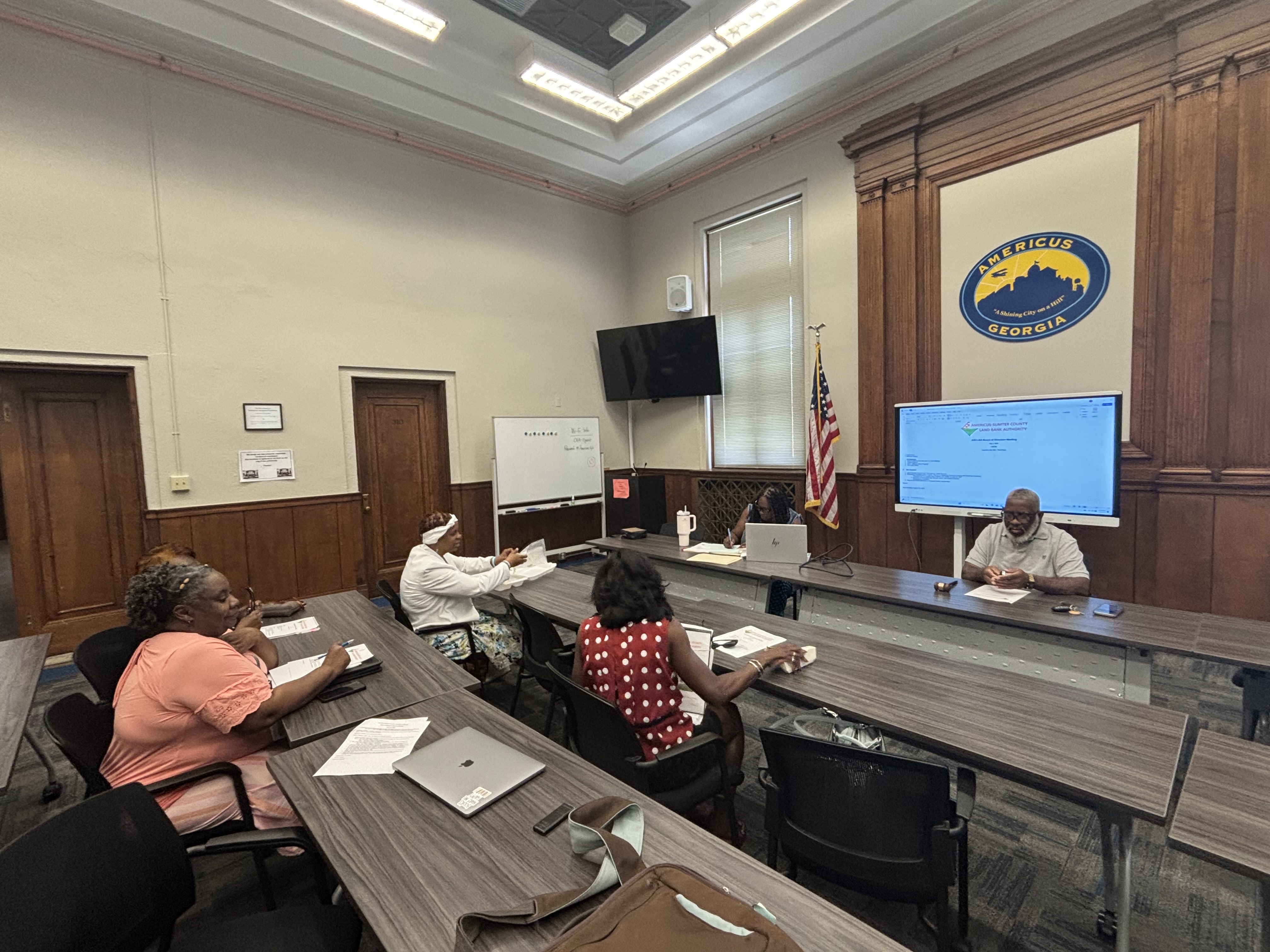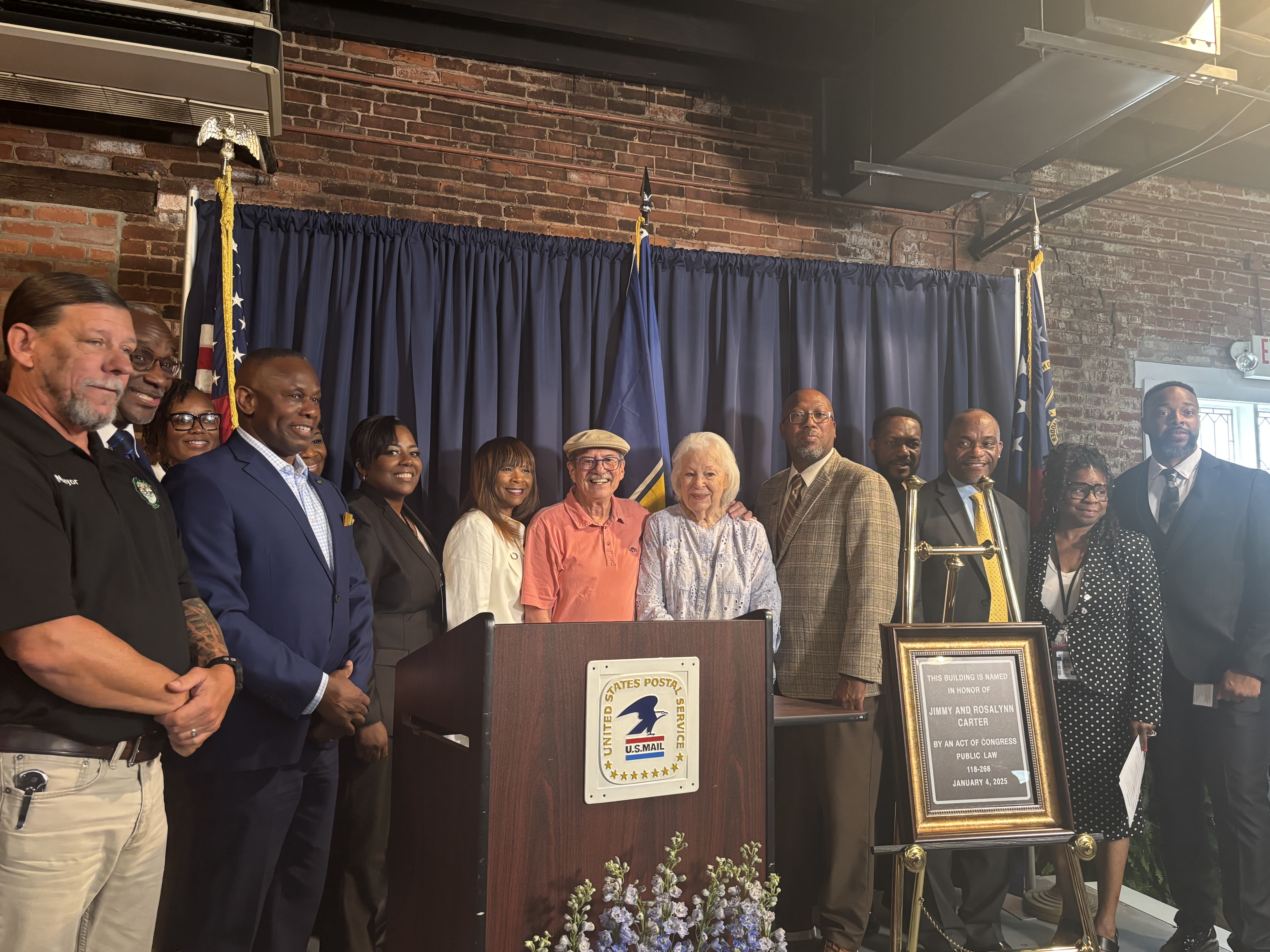Sumter BOE holds lengthy work session
Published 2:00 pm Sunday, March 15, 2015
AMERICUS — The Sumter County Board of Education held a lengthy, three-hour work session Monday in preparation for its regular meeting Thursday.
Martha Harvey, nutrition director, and Chris Usrey, technology director, gave presentations to the Board. Following the nutrition report Board member Jim Reid asked about the increase in accounts receivable and the decline in cash for the nutrition program. Harvey explained that food costs are going up; they are required to serve fresh fruits and vegetables in the elementary school and fuel costs are going up.
Reid asked how much it costs to produce a meal and Harvey said $3.06. She also said the USDA funds the local system at $3.9 million each year. The superintendent said he would meet with Harvey and the finance director to pull together some numbers for Thursday’s meeting.
Trending
Frank King of Raymond James and Associates, also addressed the Board on the ESPLOST.
King said there is a need for a new high school to replace the current, landlocked one. He said if the referendum passes on Tuesday, at best construction is still two years out.
“If you wait six years,” he said, “the cost will be much greater plus now you have the opportunity to get $14 million from the state … Interest rates will not get lower.”
King said there are 50 to 60 other school systems, such as Valdosta, Pierce County and Carrollton, trying to do what the Sumter system is.
“So you are not breaking new ground,” he said.
Board vice chair Meda Krenson asked King to explain the difference between the $25 million and the $28.5 million.
Trending
“You may not borrow $28.5 million; that’s a cap; $25 million is the maximum cap that SPLOST can collect. You will need good economic growth, about 5 percent, in your community for that to happen. … It (revenues from ESPLOST) is projected to be $3.9 million per year. About six or seven years ago, revenues were $4.3 to $4.4 million a year. In 2014, it was $3.9 million.”
Board member Jim Reid asked where the $40 million number came from and if it includes a football stadium. King said that 12 to 18 months ago, a construction management company and architecture firm came up with that figure and it doesn’t include a football stadium. He used Marion County as an example.
“They had money left over to build a football stadium,” King said. “It’s wise to get 100 acres or so, so you can build a stadium somewhere down the road.”
Superintendent Donnie Smith told the Times-Recorder previously that Marion County will need six more ESPLOSTS to pay for everything.
Reid commented that Sumter County stands to lose $600,000 a year if the new state transportation bill passes.
King said he had never seen one of these referendums fail in Georgia.
“You’re not talking about any tax increase here,” King said.
Reid said, “If we float these bonds … and voters reject the referendum, the Board will have to raise property taxes.”
“Yes,” King concurred.
Reid addressed unemployment locally.
“Jobs are available but they’re (applicants) not qualified with skills. You talked about building a school as an economic boost; that’s not true.”
King countered, “The better school system you have the better quality of life you’ll have. The school system will be looked at by prospects. If you keeping putting it off, you continue to drive up costs.”
King said the system has between $3 million and $ 4 million left over in SPLOST reserves which can be used to purchase the land, but that’s the Board’s decision.
“This has been a well thought-out process,” King said, “especially on the financial side.”
Items for Thursday’s agenda discussed during the work session included the following.
• A resolution to grant an exemption from all statutory and regulatory class size maximums for the 2015-016 school year. Board member Edith Green explained that this will keep the system from having to hire an additional teacher if a class is one student over the maximum allowed.
• A resolution for reduction in force. Busman said this is something the Board does each year.
“There is a possibility of eliminating up to 20 positions, 12 to 14 due to attrition.”
The resolution is needed because of continued state funding in education reductions and approximately 250 students scheduled to attend Furlow Charter School (which is part of the school system).
• Resolution to change the supplement amounts for high school principals from $10,000 to $20,000, and to change Certified Central Office Directors’ supplements from $6,000-$10,000 to $3,000-$10,000.
Barnes commented, “We’re approving a practice that has been in place for 10 years essentially.”
Under old business, hiring an attorney to handle “local” matters instead of having its “education” attorney firm of Jones, Cork & Miller of Macon handle them.
It was decided to allow Jones, Cork & Miller to continue with its three pending cases (one dealing with a modular building, one dealing with the logo and another dealing with an open records request from a former employee). It was decided to bring two or three names of local attorneys and their rates to Thursday’s meeting for a decision.
• Renewal of the 4-H contract with the extension agent at a cost of $12,300 per year.
• Awarding a bid for putting a metal canopy at Americus-Sumter County High School North Campus.
The reconfiguration of schools was discussed again and should be up for a vote Thursday.
Reid said “someone” had asked him why not move pre-K and kindergarten to Cherokee and let the Furlow Charter School have Sarah Cobb “so they can grow.”
The superintendent explained that Head Start, Early Head Start and the PEACH program are already located in the Cherokee facility.
A decision whether or not to go to the charter system was also discussed.
“We need to make a decision and move forward,” Busman said.
Krenson said, “If we’re considering going to the charter system, we have to make sure all schools already have good parent groups established.”
Busman said, “Every school would have its own charter and its own governing team to make recommendations to the Board.”
Smith said they would have to apply for waivers either way.
“It takes a lot of work either way,” he said. “We can live with either model.”
Barnes commented, “I’m moving more toward the model than the charter to make sure a whole lot more people are involved and make sure our students are going to do better every year.”
Reid asked how this “could come back and bite us on our you-know-what?”
“ … With the charter you can set your own goals, three percent growth. Either would require us to get better. Everybody’s going to be in the same situation as we are,” Smith said.
Reid asked how the new opportunity district plan by the governor will affect the local school system. The plan is designed to work with failing schools (based on CCRPI scores).
Smith said that Sarah Cobb was on the original list of 20 schools in Georgia, but had been taken off due to the proposed reconfiguration. He said the transportation costs should not change with the reconfiguration and the Board will address some administrative changes involved.
• The Board will adopt one of two calendars for the 2015-16 school year.
Reid still insists it would be better to start school after Labor Day like they did when he was in school because it’s so hot in August. Smith said it’s hot after Labor Day as well and the calendar is built around assessment dates required by the state as well as testing schedules. There are also five calendar adjustment days, formerly known as furlough days, for teachers and administrators. Students are not present on those days.
Reid said he doesn’t like half-days because of transportation costs. Smith explained that these are necessary for teacher planning and professional development.
“Learning occurs on those days because we monitor it,” Smith said, “and we feed the students.”
“The less meals we serve the better,” Reid commented.
Smith went on to explain that each calendar adjustment day saves the system $110,000 or $750,000 a year.
“Lots of systems had 10 days; we had 10 days at one time but we cut it to five,” he said.
Another matter of discussion was cell phones for some employees. Smith said the cell phones, which are entitled to the e-rate, are for safety. Principals, assistant principals, the system director and others have the phones in case of emergency.
“This is a practice that is funded in systems our size,” he said. “They are for school-use only and the bill is broken down.”
Smith added that he only uses his system cell phone to check his e-mail and uses his own personal cell phone at his own expense, for everything else.
Reid said, “There are 48 cell phones and the cell phone bill for last month was $3,797. I want to know how many cell phones and radios are sitting on desks for what and why. Playing the safety card don’t fly with me.”
“It’s necessary in today’s society,” Smith said, referring to a neighboring county across the river that has the same process … It’s well worth it for safety and security. Safety is of utmost importance.”
Reid said Smith could make himself a “martyr” if he wants to. He also brought up that Webster County Schools only has one cell phone.
“They also have only one school with 400 students,” Smith said. “You can’t compare it.”
Another matter was Board member travel and training. The superintendent said the recommendation is for any compensation for travel and training not be made if it is not approved by the Board before the check is cut.






